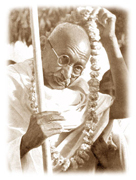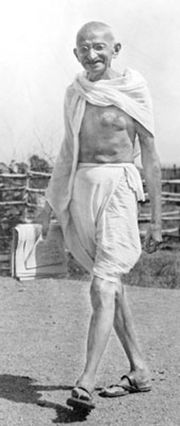
Mohandas Karamchand Gandhi was born at Probandar, on October 2, 1869. His father Kaba Gandhi was the dewan of Rajkot. His mother Putlibai, was deeply religious. Both belonged to the Vaishnava faith. In the life of Gandhi family, religion played a great part. Along with Vaishnavism, Jainism exercised an enduring influence on the family. Gandhi’s non-violence, vegetarianism, honesty, and many other traits of his religious personality, date from his early years. His father had friends in other faiths, who visited him frequently for religious discussions. Young Mohandas, while attending on his father listened to these discussions with Hindus, Muslims, Parsis, Jains and adherents of other religions. These made him tolerant and non-sectarian in his religious ideas. Before he left for England in 1888, to qualify himself as a barrister, his mother made him to take three solemn oaths! “Not to touch wine, women and meat.” This vow he kept religiously. In England, he spent large part of his time cultivating acquaintance with religious personalities – Theosophists, Christians, Vegetarians, etc. He began reading Hindu, Muslim, Christian writings and scriptures. In South Africa, one experience changed the course of his life. He was traveling in a train with a first-class ticket, and he was turned out of his compartment to make way for a white passenger. In the midnight cold, he was not allowed even to enter a waiting room. Then the moment of decision came; he decided to stay in South Africa and fight injustice, no matter what sufferings he had to go through in the process. He developed a passion for serving the poor. He felt that god could be realized through service. He devoted himself in Johannesburg to sanitary work and to nursing victims when plague broke out in 1904. He served the victims of the Boer war and Zulu rebellion. He gave up his career as a successful lawyer in Johannesburg, and started an ashram. There his Indian and European friends worked happily together in public service.
Gandhi shaped a new political tool for the masses, non-violent resistance (Satyagraha). Gandhi launched a non-violent struggle against the discrimination to which the South African Indians had been subjected by the government. After a protracted struggle, Gandhi achieved his first great victory. On returning to India, he founded another Ashram at Sabarmati: Satyagraha Ashram. All the members of the Ashram were pledged to honesty, vegetarianism, non-possession, etc. He conducted experiments on a vast scale, for realization of truth, through love and service of fellow human beings. He started a movement on uplift of untouchables. His non-violent national struggle for India’s freedom was his greatest movement. Mahatma Gandhi’s efforts achieved political freedom for India in August 1947. India became a friend on equal terms with England. In the Wake of the partition of the country into Pakistan and India, Hindu=Muslim riots had started. Gandhi threw himself in the struggle to heal the breach between the two communities. He began a fast in Calcutta and began a miracle. Then he traveled to Delhi, and started another fast, the eighteenth, and last of his life. When he received assurances from Hindu and Muslim leaders that they would do their utmost to stop the violence, he broke his fast. On Friday, January 30, 1948, at five O’clock in the evening, he went out for his daily prayer meeting. A saint was killed by his own people. Gandhi was shot three times. He muttered, “H. Ram, H. Ram”, and collapsed. Gandhi wanted harmony and peace to be established not only between Hindus and Muslims, but also among the adherents of all the great religions of the world.
.
Gandhi - The Mahatma

